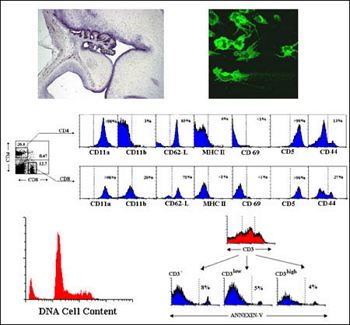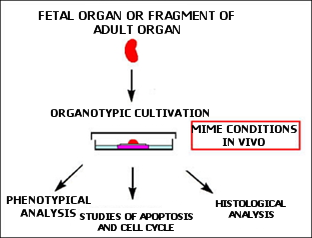MORPHOLOGICAL AND FUNCTIONAL ANALYSIS IN CELL BIOLOGY
|
Description |
Technical approaches in the field of Cell Biology applied to concrete Basic and Preclinical studies.
|
How does it work |

Immunofluorescence Techniques, in situ hybridization, and flux citomery applied to phenotypic studies, of proliferation and cell survival.
We develop routinely an extended panel of cell biology techniques including: optic and electron microscopy techniques, immunohistochemistry and flow cytometry applied to the study of cell marker expression, analysis of cell cycle and apoptosis; in situ hybridization; assays of phagocytosis and pinocytosis; cell sorting by immunobeads, density gradients, and so on. Cell cultures, including organ cultures and cell re-aggregates are also routinely developed in our lab.
|
Advantages |

Organic culture and some of its applications.
All together these techniques allow a global analysis of complex problems associated to Cell In addition, different types of cell cultures previously indicated allow the study of cell-to-cell interactions key for understanding some important goals of Cell and Molecular Biology, Immunology, Cancer, Developmental Biology, etc.
|
Where has it been developed |
All mentioned techniques are available in our lab of the Department of Cell Biology at the Faculty of Biology as well as in the Centre for Cytometry and Fluorescent Microscopy of the UCM, al cargo of prof Agustín G Zapata. Currently the research team headed by Agustín G Zapata analyse the development of thymus, largely of its epithelial component and diverse aspects of the biology of MSC in healthy and pathological conditions.
|
And also |
Accordingly, our research group offers:
- To study possible effects of experimental molecules or drugs
- To learn our available techniques to other students, professionals, etc.
|
Contact |
|
© Office for the Transfer of Research Results – UCM |
|
PDF Downloads |
|
Classification |
|
Responsible Researcher |
Agustín G. Zapata González: zapata@bio.ucm.es
Department: Cellular Biology
Faculty: Biological Sciences


